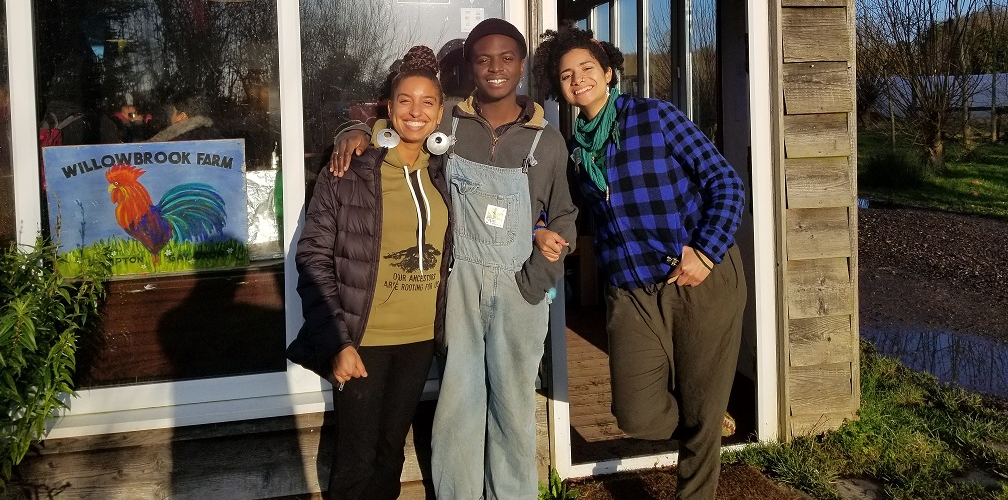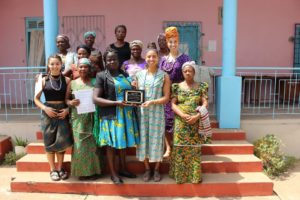“We must rapidly begin the shift from a thing-oriented society to a person-oriented society. When machines and computers, profit motives and property rights, are considered more important than people, the giant triplets of racism, extreme materialism, and militarism are incapable of being conquered./ A true revolution of values will soon cause us to question the fairness and justice of many of our past and present policies.” ~Dr. Martin Luther King Jr.
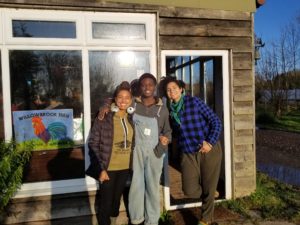
Although the land may be resting this winter, members of the Soul Fire team have been busy getting ready for the upcoming season and spreading our food sovereignty message at a variety of conferences and events while deepening our networks across the country and globe. Leah Penniman traveled to the UK for the Oxford Real Farming Conference (ORFC) to present a keynote on “Farming While Black” and was on several panels. The panel sessions included a collaboration with Maggie Cheney of Rock Steady Farm on “Putting Social Justice at the Heart of Your Farm: Lessons from America” and one with Nelson Mudzingwa & Jyoti Fernandes, titled, “Agroecology Schools and Training for Climate Resilience.” Li also participated in the people of color (POC) caucus organized by Land in Our Names (LION) (pictured above). Li’s workshop with Shared Assets and LION was called “Farming So White: Land Ownership, Race and Racism in Britain.”
Amani Olugbala dropped their wisdom in Saratoga Springs, NY for an MLK Celebration and spoke at Today’s Horticulture Symposium in Kennett Square, PA. Naima Penniman, Soul Fire Farm’s incoming Program Director, lectured at the Northeast Earth Coalition in Montclair, NJ and gave the keynote at American Farmland Trust’s Conference. At the American Farmland Trust Conference titled, “Food, Farms, Fisheries, and Forests ” in Boston, MA, they spoke of the history of racial oppression in food and land systems and their impact on Black and Indigenous folks. They talked about how folks are resisting these past and present injustices and striving to build an equitable, sustainable food system with regenerative, community-based growing. Cheryl Whilby, Administrative Program Manager, accepted an award on behalf of Soul Fire Farm from the Albany Girlfriends Community Fund.
Other events included Leah’s keynote at Future Harvest in Hyattsville, MD, a talk at CUESA in San Francisco and a keynote at EcoFarm in Pacific Grove, CA. The workshop was transformed into a panel for BIPOC farmers to speak about their work, barriers they experience, and what solidarity looks like. The keynote discussed the role of Black farmers in creating regenerative agriculture and reviewed the demands shared by local BIPOC-led farming organizations. Leah also recently spoke at Hebrew College, Newton Center, MA, and the Mountain School and Bennington College in Vermont. She also uplifted the work of the Northeast Farmers of Color Land Trust at the Karuna Center for Peace Building and gave a workshop on the Plants of Black Freedom through the American Herbalist Guild webinar series.
Announcements
- Read our 2019 Annual Report, beautifully put together by Damaris Miller!
- Farming While Black is available for purchase on Powell Books, an independent bookstore in Portland, and Indie Bound, a website that connects consumers to local, independent bookstores in their area. Reserve your practical guide to liberation on land today!
- Farming While Black recently won the Choice magazine award for Outstanding Academic Title.
Upcoming Deadlines
- Soul Fire Farming Immersion application priority deadline is March 1st. All applications received after March 15th will automatically be waitlisted. The farming immersion webpage is complete with a new name, fresh description, the new application and translations. Please note the name change to simply the “Soul Fire Farming Immersion.” It is challenging to find language to hold all of our complex identities, but the immersion program continues to center aspiring, beginning, and intermediate growers of Black, Indigenous, and Latinx heritage.
Upcoming Events
- February 27, 2020: Keynote at MOSES Conference, La Crosse, WI (Leah)
- March 3, 2020: Soul Fire Farm virtual info session (Leah)
- March 6-7, 2020: Organic Growers School, Mars Hill, NC (Leah)
- March 10, 2020: Food Literacy for All Course at University of Michigan, Ann Arbor, MI (Leah)
- March 13, 2020: African Roots Center, Kingston, NY (Leah)
- March 18, 2020: Rio Salado College, Tempe, AZ (Leah)
- March 20, 2020: Westfield State University, Westfield, MA (Leah)
- March 26, 2020: Clark University, Worcester, MA (Leah)
- March 29, 2020: TEDx, Rochester, NY (Leah)
- April 1-2, 2020: SUNY Potsdam, Potsdam, NY (Leah)
- April 2, 2020: Shippensburg University, Shippensburg, PA (Amani)
- April 4, 2020: GreenThumb Conference, New York, NY (Leah)
- April 18, 2020: Community Farm Day 9am-1pm at Soul Fire Farm, Petersburg, NY register here
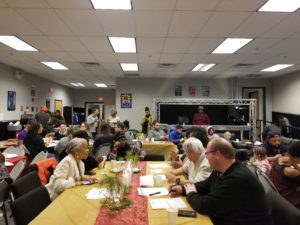
During the 8 years of our Ujamaa Farm Share program we delivered over 10,000 bushel boxes of fresh produce, medicine, and eggs to our neighbors in the Capital District. For 3 of those 8 years, Larisa Jacobson was our Farm Manager who helped our soil regain its health through low-tillage and regenerative practices. During this time, she also grew more healthy Afro-Indigenous foods and plant medicine for our Ujamaa Farm Share members. On January 26th, we gathered for a CSA celebration to thank members of our Farm Share program and those who helped make the Farm Share possible with a delicious 3-course dinner catered by our Kitchen Magician, Ria Ibrahim Taylor and featuring our farm’s ingredients. At this event, we shared food, ideas, and envisioned a new future of nourishing our community.
Starting in 2020, we will be shifting from the CSA food distribution model toward “Solidarity Sharing,” partnering with community groups like the Center for Law and Justice wellness clinic, the Victory Bus Project, and organizations that work with the refugee community. This spring, we will be deepening our initiative to build home gardens with folks impacted by food apartheid through the Soul Fire in the City Program. If you live in Albany or Troy and are interested in getting support to grow your own food, please reach out at love@soulfirefarm.org and we can help you get started. For those interested in sponsoring a garden, consider donating here.
Earlier this month Leah, Naima, and Neshima awarded the Manya Krobo District Queen Mothers in Odumase-Krobo, Ghana a Citation of Honor for all of their work in community, sustainability, mentorship, economic opportunity, and maintaining their cultural traditions. The Queen Mothers also received scholarship funds from Soul Fire. Leah, Naima, and Neshima looked to the Queen Mothers to seek guidance on our work in the diaspora. We hold a deep reverence for these Queen Mothers as they not only trained and initiated Leah, but inspired li to make Soul Fire a reality.
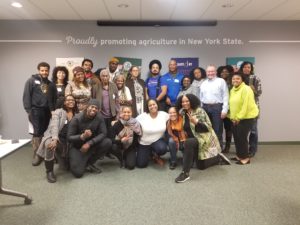
While New York State has remained committed to both growing the agricultural industry and promoting inclusivity, the New York State agricultural industry remains one of the least diverse sectors in the state. Over the past few months, Black farmers have shown up powerfully and continued to share their voices to advocate for statewide policy change. Black Farmers had the opportunity to meet with the New York Commissioner of Agriculture to address the under representation and systematic issues black farmers face. In order to have more black farmers, we need increased access to land, financial support, and stronger networks.
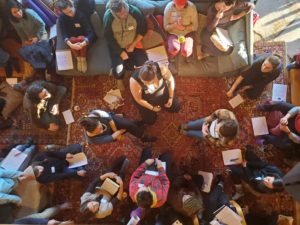
On Wednesday January 29th, the Young Farmers Coalition New York chapter came to the Farm for a Uprooting Racism in the Food System training. Naima and Leah co-hosted this event. The Hive was packed with young farmers learning about racism and how to work in solidarity with Black and Brown farmers. In addition, Naima and Leah hosted another Uprooting Racism training for the Connecticut chapter on February 19th in Torrington, CT. As a part of the uprooting racism training, we discussed the connection of wealth and racism in the United States.
In February, Amani participated in the NYSAC Panel Discussion titled, “Connecting the Dots: To Food Security from Wealth Equity” in which the multi-dimensional nature of food security was discussed. One of the four main components is the goal of stability. Stability in this context means that all people have physical, social, and economic access to sufficient, safe and nutritious food which meets their dietary needs and food preferences for a healthy and active life. Food security is affected by human, social, financial and natural capital.
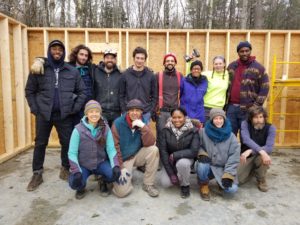
Our building and livestock staff have been busy at work this winter to prepare the farm for the upcoming season. Jonah Vitale-Wolff and Kai Thomas have been working around the clock to build the new cabins and bathrooms at Soul Fire. In early 2020, we had a community effort to put up the walls of one of the cabins. We are looking forward to having the new community space for our programs on our farm! In addition to new buildings coming to the farm this season, our Livestock Manager, Justin Butts, has been hard at work preparing the farm for the new animals arriving in spring. He has been taking courses on bee-keeping, shepherding, and butchering. We are excited to have this opportunity to diversify our farm operations this season!
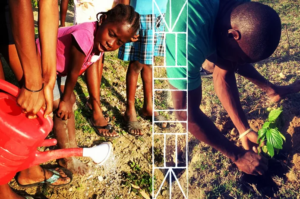
Our long-time friends in Ayiti are coming together to cook up food grown by the phenomenal farmers in the area, in a time where buying groceries is not an option for most people. Instead of waiting for emergency food rations from USAID, members of OJADCOL (Organisation des Jeunes Actionnaires pour le Développement de Cormiers Leogane) are uniting to set up a community restaurant to nourish people who are hungry in Barrier Jeudi, Komye (Cormiers in French) a rural village in Léogâne. Their goals are two-fold: 1. to improve people’s food and nutritional conditions by serving one hot meal a day and 2. to promote agriculture in the area by supplying the restaurant with local harvest and goods. Funds raised will go to kitchen supplies, food, fuel, and stipends for cooks and coordinators. Thank you so much for donating what you can to support their effort!” You can donate to and share this link.
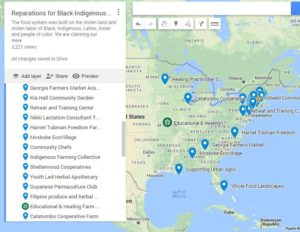
Oppression underwrites our food system, and a tangible action we have taken for addressing food security and food sovereignty issues in our communities is taking reparations into our own hands through the creation of the Reparations Map for Black-Indigenous Farmers. We recognize that the food system was built on the stolen land and stolen labor of Black, Indigenous, Latinx, Asian and other people of color. We also know that we cannot wait for the government to acknowledge that stolen wealth and land must be returned. Some farmers have already received funding through this project, and we want to provide that opportunity to other Black and Brown farmers. If you have resources you want to share, contact a farmer directly to share them, or if you have a project you want to include on the map, contact us!
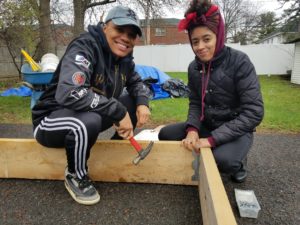
This spring, we will be deepening our initiative and solidarity with folks impacted by food apartheid in the Capital District by building 10 home gardens with the Soul Fire in the City Program. If you live in Albany or Troy and are interested in getting support to grow your own food, please reach out at love@soulfirefarm.org and we can help you get started. For those interested in sponsoring a garden, consider donating here.
Learn more about Soul Fire Farm’s work and spread the work about food sovereignty! Here are our most recent media appearances:
- Article in Today
- Interview on Today
- Lecture at Harvard Divinity School Center for the Study of World Religion
- Lecture at Williams College
- Feature in Patagonia Cleanest Line
- Interview on BBC Sound
- Podcast on Le Vital Corps Salon
- Feature on PBS Food
- Mention in Hudson River Flows
- Podcast on The Doctor’s Farmacy
- Book Award in American Library Association
- Equity for Farmers Elizabeth Warren campaign
- Article in Vice News
- Panel at Food Tank
- Interview with Beautiful RVA
This month’s Love Notes was written by Kiani Conley-Wilson.

